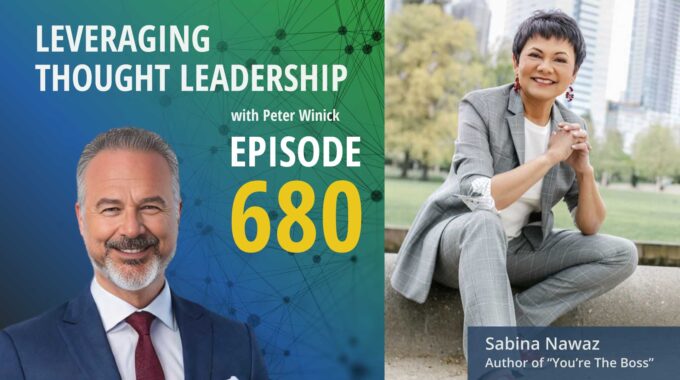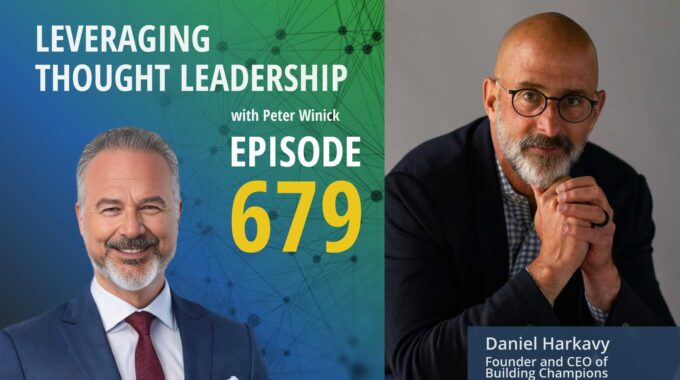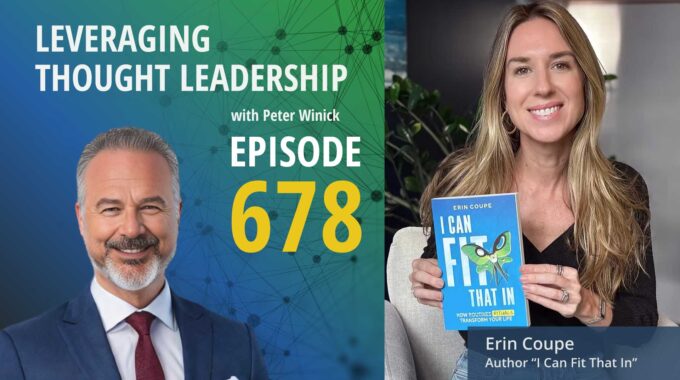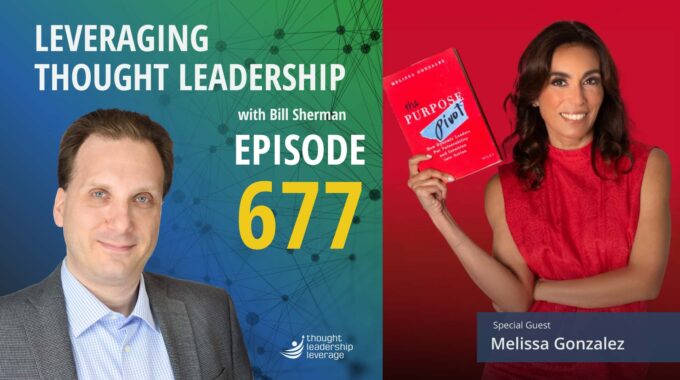The Hidden Cost of Corporate Pressure—and How Leaders Can Rise Above It This episode explores…
Leveraging Thought Leadership With Peter Winick – Episode 103 – Bronwyn Fryer
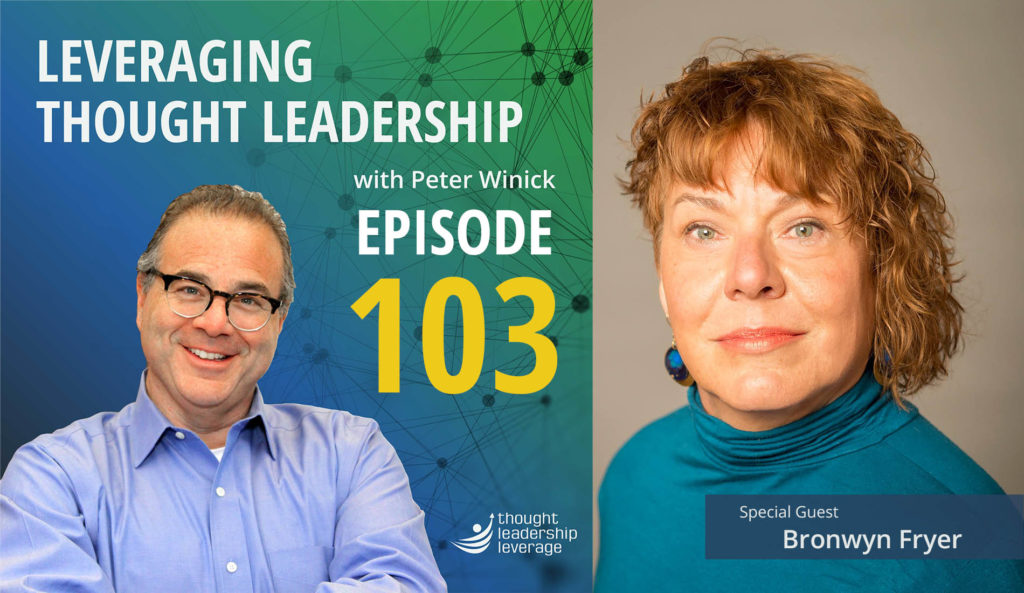
If you’re writing (or have written) a business book, you need to spend time thinking about the audience you’re trying to reach. Do you know how to speak their language? Should you seek out a writing partner, or ghost writer, to make sure your message is clear?
Our guest in this episode is Bronwyn Fryer, collaborative writer and veteran editor who has worked with best-selling authors such as Dan Ariely, Jonathan Quick, Dr. Edward Hallowell, and Fred Kofman. She’s also spent nine years at the Harvard Business Review, and has collaborated with thought leaders like Eric Schmidt from Google, John Chambers from Cisco, and many others.
Peter and Brownyn discuss the improvements a ghost writer can bring to your manuscript, and what publishers are seeking in business books today. In addition, she shares advice on how to outline a book, drive your schedule to create the manuscript, and negotiate the long-term effects of putting your book on the market. Listen in!
If you need a strategy to bring your thought leadership to market, Thought Leadership Leverage can assist you! Contact us for more information. In addition, we can help you implement marketing, research, and sales. Let us help you so you can devote yourself to what you do best.

Transcript
Peter Winick And welcome, welcome! this is Peter Winick. I’m the founder and CEO of Thought Leadership Leverage. And you’re joining us on the podcast today, which is Leveraging Thought Leadership. And I’ve got a really cool and special guest, an old friend of mine today, Bronwyn Friar. Let me give you her official sort of bio here. Bronwyn is a veteran writer and editor who collaborates with thought leaders to produce influential books. She’s worked on more than a dozen amazing books, including nearly all of the bestsellers by Dan Ariely, who’s the author of Predictably Irrational. Gregorsen’s books, Dyer’s books Christensen’s books The Innovator’s DNA Dr. Jonathan Quick’s The End of Epidemics Romania Ibarra’s Act Like a Leader and prior to that, she spent nine years at this little magazine you may have heard of called the Harvard Business Review and there she collaborated with dozens of thought leaders including Eric Schmidt from Google John Chambers from Cisco the list goes on and on so Bronwyn is someone who’s been deep in thought leadership for a long, long, long time, usually sort of behind the scenes So I had a. sort of coerce her a little bit to come in front of the mic today. So thanks for joining us today.
Browyn Fryer You’re welcome, Peter. Glad to be here.
Peter Winick So let’s just dive in from your take as a ghostwriter, which is a really interesting position. If I were an author or a thought leader that was sort of shopping for a ghost writer, what are the things that I should be thinking about or asking? Because it’s a really different relationship. It’s not just about the skills, but the chemistry and the connection. So what are things I should looking for?
Browyn Fryer Well, I like to joke that a collaborative relationship like this is kind of like getting married. So you really want to do your dating. You want to check out the other person very carefully. You want understand that it’s a real relationship. So there’s a lot of give and take. There’s forgiveness involved when there are mistakes made. Communication is paramount. and you can’t take anything for granted. So I’ve collaborated with many, many people over the years and what’s the most important thing in a ghostwriter is the ability for that person to listen extremely carefully and to understand what you are saying. Sometimes if it’s a very technical thing, then you may. have to explain yourself. The ghostwriter will be asking you a lot of questions, getting you to unpack your thinking. And if these questions sound stupid, it’s not because the ghostwriter is stupid, but because the ghost writer’s job is to translate what you are saying for an audience that may not understand your vernacular. Got it. You also want to make sure that you have some kind of good chemistry with the person. It doesn’t work if that person is too bossy or doesn’t ask enough questions. You want a nice balance between assertive questioning and deep listening.
Peter Winick And where does it sort of pivot or swing between scribe and intellectual sparring points?
Browyn Fryer Yeah, you don’t want to scribe. I mean, if you want to develop a book with somebody, you’re not gonna wanna scribe, that’s pointless. Yep. That’s not gonna get you where you wanna go. You need somebody who has experience in the publishing industry, who’s done this before, and who has had a good track record of doing it before. There are a lot of so-called ghost writers out there, and particularly since the journalism industry has gone south, there are fewer and fewer positions for journalists. It’s my understanding that there are a million people who want to go out there and go strike for you, and lots of people who are good writers and are good journalists, but it doesn’t necessarily translate from journalism into collaborative writing. So I was a journalist for years, and my job was to, you know, take down what people said and then report on it, but it’s not the same as this.
Peter Winick The collaborative piece, The Outcome, is a business book which has its own sort of rules or best practices or whatever you want to call it in terms of how do you translate either something highly technical or someone’s content in a way that it flows and there’s a narrative in a book that doesn’t seem technical or whatever. Because the greatest business books bring stories to life.
Browyn Fryer That’s right. So the books that sell and that you will sell to an agent and or publisher have to have lots of stories. The stories should be original, as far as possible. Sometimes they can come from the public domain, but if they’re personal, that’s much better. They need to be really well written. So what publishers often tell me is they want to be in the room with you. So that means a really good first-person understanding of what the situation is.
Peter Winick Got it. I was going to switch a little bit to the other amazing benefit that someone gets from working with a world-renowned ghostwriter like yourself is you’ve written more books than your clients will write. Most of your clients maybe write a book, two, three, maybe five, something like that. You’ve been at it from the journalist side at Harvard Business Review and then on the publishing side. So you’ve got sort of a leg in each of domains and can help. work with the quote author to basically satisfy all those constituents. Could you talk a little bit about what publishers are looking for today? Because often it doesn’t matter the book that you want to write.
Browyn Fryer Yeah, that’s a really good question, because if you’re publishing a business book, the first thing you want to do is you want go and look at the comparable books or the competitive books for what it is you wanna write.
Peter Winick And that’s where a lot of authors will say, oh, but nothing like this has ever been done before. And the publisher hears that as this person didn’t do their homework.
Browyn Fryer Yeah, that’s a really, really important thing to do. So you want to go to your bookshelf. You want to check out on Amazon, and you want to read those books. You don’t have to read all of them, but you want read at least the closest competitors. And you want make sure that your book is counterintuitive and very different from what those books say. So what publishers are looking for is something that’s very counterintuitive, that’s full of really well-written original stories. that has a story arc. So the chapters are all interconnected and there’s a beginning, a middle, and an ending. So typically these books are, they start out presenting the scope of the problem in the introductory chapter or two. And then they give us more of the background on that problem. And then, they say, okay, what are we gonna do about it? And then the spend the rest of the book. dissecting the solutions to the problem and then with a nice sort of wrap-up at the end saying how do you apply this on Monday morning when you go back to the office.
Peter Winick So let’s touch a little bit on the other things that the publisher is looking for. They want a well-known person.
Browyn Fryer I’ll tell you that.
Peter Winick So that’s where I was gonna go in terms of well-known meaning sort of having your platform built and the followership. And I think for you to weigh in, 15 years ago was probably 80% on the gravitas of the book and how interesting or new or different it is today. And I don’t know what that number is. It’s probably at least 40 to 60% on the author’s ability to sell books, which means your platform and how well-know you are. So talk about that a little bit, because that’s often a foreign language for folks. Ha ha ha ha!
Browyn Fryer Yeah, that’s a big one. I mean, it’s super, super important because publishers don’t do the PR that they used to do for books. They say they will, but they won’t. So the only way that you can really impress them is to have a ready-built platform already, which means you’re out there on social media, you have followers on social, media you published in other media, preferably. a high-end publication like the New York Times or Scientific American or the Harvard Business Review, you have a good following and a good reputation. And you’re very assertive about getting there out there in front of audiences. So you’ve done keynotes. You’ve done lots of conferences. It’s kind of pointless to try to write a book without any of that. You can write it, but nobody will publish it because the publishers want to see your platform first.
Peter Winick Right, so if you think about this in a linear way, if I wanted to write a book and I’ve got 11 followers on Twitter or whatever, and I haven’t given a keynote, not good. So I need to be building that and probably spending two or three years getting that up to speed, not full time, but as a strategic initiative. Yeah. So you mentioned a couple of things. It’s getting into short form pieces, it’s getting in the keynotes, it all those things. Touch a little bit on if you would on the gap today between traditional sort of New York publishers and the non-traditional and how it’s changing at a really rapid clip. Because it used to mean if you went self-published was sort of Latin for I didn’t get published by a big New York house. That’s not the case today. Thanks for watching!
Browyn Fryer Well, you know, sometimes if your book does well as a self-published book, a major publisher might pick it up. Very often people come to me and what they want is really the equivalent of an expensive business card. Correct. They want to use it for marketing. They want use it as pass alongs. They want give it out at conferences. They want sort of a repository of their thinking. and they make the investment in hiring me to write the thing. whether, regardless of whether it gets published by a standard New York publisher or not, I’ve had clients who would use the imprint of a New York published, say Simon & Schuster has a dedicated unit that will help people publish their self-published books under their imprint. So it looks like Simon & Shuster published it, but it’s really, you know, you paid for it, you bought it.
Peter Winick And how much does that matter today? Because I always say that I’m the only dork that I know that when I buy a book or open it on my Kindle, I go back to the filler pages to see who the publisher is because I’m curious. But when you think about how most people buy a book today, they download it on a Kindle. Hit Go, and you’re on the opening line is the best of times, it was the worst of times. You go sort of right into it. Or is that not true?
Browyn Fryer Well, I think most people buy on the basis of recommendations. So if your friends recommend the book or it gets five stars on Amazon or whatever it is, then people are more inclined to read it. If it gets one star, nobody’s going to read it, which is why it’s important to invest in having a collaborative partner who is a really good writer. You know, you may not respect writing a lot, but other people do. And I have to say in the business book arena, The bar is relatively low. You don’t have to be Balzac, you know, but you have to be able to tell a good story in an interesting way and it can’t and it has to hit the right tone. It has to be a combination of colloquial and friendly and also intellectually challenging or interesting. Got it. And many of these books, I think, don’t really think about the audience appropriately.
Peter Winick So tell me about that. So let’s talk about writing to an audience. Tell me about, that because sometimes someone, I’ll talk to a potential client and I’ll say, well, who is this for? And they’ll say for everyone, which is a nightmare, but talk about sort of writing to the audience.
Browyn Fryer Well, let’s say, let say, you know, if you’re a professor, you want to be writing for a business audience, you wanna be talking about your executive class, you know, where you teach executives to do stuff. For business books, that’s typically the kind of audience you’re talking to top managers. You’re almost never talking to middle managers. You’re always talking to CEOs or the C C C suite or the proxy for the C suite. Sometimes you’re talking to consultants, but You know, in writing for the Harvard Business Review, we just always understood that we were writing for either the C-suite or people who saw themselves going to the C suite in a few years. And that’s the audience you want. And then I also tell people, think about one person who you know, who you really want to really love this book and write to that person.
Peter Winick So when you say one person, someone you actually know, a potential client, a friend, a colleague that’s an executive at Company X, and say, I’m writing this for a friend.
Browyn Fryer Yeah, because it’s helpful. If you’re a singer, sometimes it helps to look at one person in the audience and sing to that person. It’s the same kind of thing with the tone of a book. You want to imagine that person in front of you and speak to that person. Got it. It helps you get your heart engaged, not just your head.
Peter Winick So let me ask you this, one of the things I see often, as I’m sure you do, is someone wants to write a book and typically the people who want to write books are super busy, type A, they’ve got a great job or a great gig or a position in academia or consulting or whatever, and they assume it will take two hours a week, so they do their little spreadsheet and blah blah blah. Talk about sort of the time allocation of, I heard the chocolate, right, of sort of. What it really takes is I’ve yet to hear it’s sort of like remodeling a house, right? It’s never going to be under budget and done faster than you think. But what are the, what should I really be thinking? Forget the money for a minute, but like headspace and all that stuff. You’ve been through a lot.
Browyn Fryer Okay, so typically, I’ll just tell you the way I work. So when somebody decides to hire me, then I go and I take two days of their time, and that’s two full days of uninterrupted attention.
Peter Winick Which by the way, that sometimes takes an act of Congress to get, right? Two, that’s not in the office taking phones, ideally outside of the office, lock down, hand me your phone, the whole deal, yep.
Browyn Fryer And so we’re locked down in a conference room, and we work through the argument of the book. So that’s like the jacket copy, if you will. And then we walk through the contents of the chapters. And then, we link the contents of the chapter in a flow, so it makes sense as a flow. The more you are able to be prepared for this conversation, the better. So if you have… say research papers or data or reports or PR materials, whatever you’ve got, you wanna be able to bring all that together into the conversation. But the conversation you and I would have would be the shape of the book, the argument. We would talk somewhat about marketing, but mostly that’s kind of an add-on. What I bring to the party is the content of the books. So that’s two under interrupted days. And then I go away and I start drafting and I send you stuff. And then you and I work together. Based on that day. Or your team and I worked together. Yeah. To produce, so I’m talking for a book proposal which precedes a book. So then I would go away and I would write up the overview. I would right up the introduction and I will write up a sample chapter based on what you’ve told me. And it’ll have lots of holes in it. and then I give it to you and then you fill in the holes. And then I go back and re-edit. We iterate for probably, it’s usually three iterations until we’re happy with those three pieces. And then the other things are fairly easy to add in. So that’s the marketing platform and the.
Peter Winick I was going to say those three pieces, you’re capturing the foundation of the book, a byproduct of that is you’re getting my tone, my voice, however you want to call it, the framing, and you’re also figuring out your working styles, how one works with each other. Interesting. Interesting, interesting. Very cool.
Browyn Fryer Yeah. And the proposal is really important because it’s the blueprint for the book. So another really critical piece of this is the chapter descriptions, which are typically, say, four paragraphs each.
Peter Winick Which forces you to think through the flow, right? So when you- Exactly. To do each chapter, you have to figure out is it eight chapters, is it 14 chapters, how do they build on each other, et cetera. So it really forces you to think though the framing and the style. What are the other things I should be thinking about before I choose to even write the book? So you’ve got a good process there, but when might it not be the right time for me to do it? Right? If I’m thinking this is something I want to do, I might do whatever. But what are the things I could say, you know-
Browyn Fryer There’s so many answers to that one, yeah.
Peter Winick Okay, well, what would you give me as a, you know, three things to determine if maybe now’s not the time to take out the quill just yet.
Browyn Fryer Well, you know, a lot of it is zeitgeist. It depends again on whether you want to self-publish or go with a major publisher. You know, right now all the major publishers are up to their noses in Trump land. Yep. So there’s a lot of competition to get their attention because what they really want is another tell all about Trump.
Peter Winick Right. They want another fire and fury. Right. Right, right, right.
Browyn Fryer Yeah, but for business books, they’re looking for the counterintuitive and the new. And I don’t think we need another book about the dangers of AI. You know, they’ll tell you, publishers can answer these questions directly. So what you’ll do with me is after we have our proposal, then we talk to an agent. And I know many agents and the agents will give you feedback. And then… The agents are in touch with the publishers all the time, so they can tell you what the publisher is looking for and not looking.
Peter Winick But the AI example, so what’s interesting is just because you’re reading it every day in the Wall Street Journal or in Fortune or Forbes or whatever, doesn’t mean you should write a book on it even if you can, because your book’s not coming out for 18 months. And you can’t take a long form book and write it about current events, your timing’s Have a good one.
Browyn Fryer Yeah, that’s the other thing is, it takes a long time to publish a book. So you have to commit a year, basically, to preparing the book, to writing it through. And then the publishers, if you’re going with a major publisher, they take another nine months to get it set up and marketed. So it’s almost a two-year process.
Peter Winick Right, so you have to do it in a way that’s somewhat, I don’t wanna say timeless, but not as time-sensitive as one would typically, right? Because nobody wants to read about, you know, I mean, I shouldn’t say nobody, but like blockchain is now in the newspaper every day, five, six years ago when the first couple of books came out, that was really, really interesting. Now most people are quasi-fluent or aware of what it is, so it’s not as groundbreaking.
Browyn Fryer Yeah, and so this is the other thing. If you have something that’s timely, do it in short form and get it out on your platform. Exactly. So publish an article, publish a blog, go talk about it, because all these things are chapters or potential chapter fodder for the that you will eventually write.
Peter Winick So I want to sort of end on a high note here, because I feel like a lot of this has been the pain and the behind the curtain side, but you’ve been involved in some amazing game changing books, right, just over the years, Predictably Rational and so many others. Talk about a little bit of sort of the upside, the benefit, the value, and I’m when a book comes out and it doesn’t have to be commercial except that they’re incredibly proud of but it’s the book they wanted to write and the market received it well. Talk a little bit about being on the other side of the finish line because very few people have that perspective.
Browyn Fryer Everybody’s happy to have a book with their name on it on the shelf short It’s something they can be proud of they can pass on to their friends and the relatives and you know, that’s a huge plus Just by itself for the ego gratification of it the legacy gratification Of it sometimes for a game-changing book. It literally changes society You know, I think before Dan Ariely’s predictably irrational came along nobody understood what behavioral economics was. Right. And he made it understandable and palatable in a way that everybody can relate to. He did it with humor and it’s a very interesting fun read as well as a very deep read. These are the kinds of books that have legs that they will go on for a long time. Typically, business people don’t write books like that. They can, but they don’t. If they’re going to write a groundbreaking look like that, you know, I always encourage people to think about maybe a co-author. who has got some academic research legs. Make it a sack race.
Peter Winick The grounding in academia at some level needs to be there unless you’re writing some sort of a bubblegum book. But unless there’s some academic, you know, some research base or something, you’re not going to be in HBR.
Browyn Fryer Yeah, you have to have research.
Peter Winick Interesting. So that sort of legacy piece. Final thoughts as we wrap up here. You’re chock full of so much wisdom. Any else you would share with folks? No pressure.
Browyn Fryer Good luck, have fun! Remember this is, this is a marathon, so you don’t want to burn yourself out too fast. Yep. You want to drink lots of water.
Peter Winick Lots of water and other fluids.
Browyn Fryer Lots of water. And you want to really think about the long-term effect of this thing. Like, how is it going to really move the needle in my world? How is it going to change employees’ lives? How’s it going to change leadership? How it’s going to the way we approach capitalism. What can we do that is new and supportive and societally beneficial here?
Peter Winick Well, thank you so much, as always, for sharing with us. All right. Thank you.
Browyn Fryer Great to talk to you.
Peter Winick To learn more about thought leadership leverage, please visit our website at thoughtleadershipleverage.com. To reach me directly, feel free to email me at peter at thoughtleadershipleverage dot com. And please subscribe to Leveraging Thought Leadership on iTunes or your favorite podcast app to get your weekly episode automatically.


